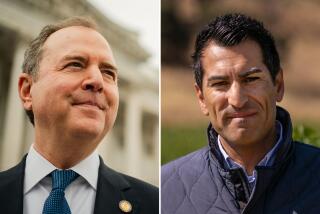Assemblyman Apologizes for Slur
- Share via
SACRAMENTO — Assemblyman Steve T. Kuykendall, who represents parts of Long Beach and the Palos Verdes Peninsula, used the slur “Japs” as he introduced a World War II-era Marine Corps Medal of Honor winner at a recent Capitol ceremony, prompting other Assembly members to accuse him of insensitivity.
At a noontime event on the Capitol steps Thursday, Kuykendall told the crowd that the Marine veteran being honored had “killed eight Japs in 17 minutes” during the battle of Guadalcanal, according to a tourist who heard the remarks.
Kuykendall, a first-term Republican, later acknowledged that he used the World War II-era slang, but added: “I don’t know if I said ‘killed.’ ”
After Kuykendall learned that one of his supporters--a former Long Beach mayor--had called on him to apologize for using the slur, he did so, saying: “I apologize. I’m sorry I did that. I certainly didn’t mean to offend anybody.”
Kuykendall, 49, is a Vietnam War veteran and former Marine captain who was mayor of Rancho Palos Verdes before winning the Assembly seat in 1994.
He won election by less than 600 votes, and is high on the Democrats’ list of Republican incumbents who are targets for defeat in the November election.
Kuykendall said he has “probably got a lot of good Japanese supporters,” citing donations from Japanese auto manufacturers and the endorsement of Eunice Sato, a Japanese American who was mayor of Long Beach from 1980-1982.
*
Sato called on Kuykendall to publicly apologize for using the slur, and said Kuykendall’s use of it was “terrible.”
Sato said she would continue to support Kuykendall in his reelection, but added: “It sort of puts second thoughts in your mind.
“It’s inexcusable,” Sato said. “Someone in his position should know better. . . . It offends any enlightened person.”
Assemblyman Nao Takasugi (R-Oxnard), the one Japanese American in the Legislature, called his colleague’s use of the term “very regrettable.”
He said that although the term was common during the 1940s, “today, we are in 1996, and I think it’s not appropriate.”
“It’s very offensive to Japanese people, and especially those of us of Japanese American descent, including many who went to war for the United States,” Takasugi said, adding that one of his cousins was killed in World War II in Italy.
“I’ll probably talk to Mr. Kuykendall when I get back to Sacramento. If he is not aware of it, I’ll let him know it is not a term used in good company today,” Takasugi said.
Assembly Democratic Leader Richard Katz of Sylmar also criticized Kuykendall, saying the use of the slang showed “insensitivity,” adding: “There are ways to honor people without denigrating other people. Hopefully, by now Mr. Kuykendall would have learned that.”
Kuykendall made the comment on the north steps of the state Capitol, as several state workers on their lunch break and tourists looked on and as a Marine band prepared to play.
One tourist, a man visiting from Orange County, was so offended that he called The Times to relate what Kuykendall had said.
“It might have been appropriate in 1946. It was a little inappropriate in 1996,” the man said, asking that his name not be used.
Kuykendall had introduced several Marines who had won various medals, including the one whose heroics were at Guadalcanal.
“Certainly, the intent was not to offend anybody,” Kuykendall said.
“The intent was to give some context to how this man won his Medal of Honor.
“It was not meant to be derogatory to any group,” he added.
“It’s probably viewed as a derogatory term in Japanese eyes. Yet at the time, it was a very normal term. From my perspective, I would not use the phrase . . . in any other context.”
More to Read
Sign up for Essential California
The most important California stories and recommendations in your inbox every morning.
You may occasionally receive promotional content from the Los Angeles Times.













